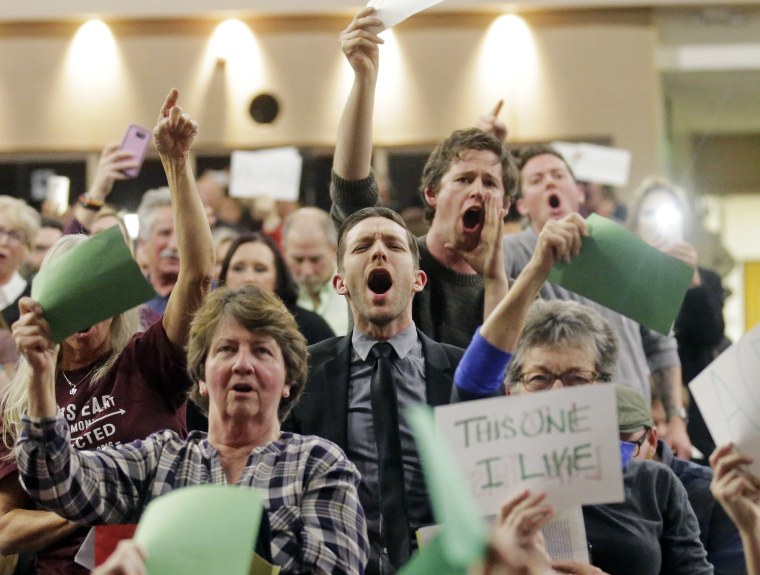WASHINGTON — Members of Congress defend their month-long August recess as a chance to return to their home districts and hear directly from constituents. But this year’s break may involve a lot less listening than in past years.
Just a handful of Republicans held open town hall meetings during last week’s July 4 break. Among those who opted out was House Speaker Paul Ryan, R-Wis., who used the same reasoning many of his members have in explaining why they are avoiding open forums.
"Aside from the obvious security concerns, what we have found is there are people who are trying to come in from out of the district to disrupt town hall meetings and not have a civil discussion,” he told reporters in his home state of Wisconsin last week.
Ryan is the highest-profile Republican to opt against holding town halls ahead of what will likely be the GOP’s final push to overhaul the nation’s health care laws. Democratic groups, motivated by their opposition to President Donald Trump and Republican efforts to repeal the Affordable Care Act, have turned the events into contentious demonstrations of progressive opposition.
And after watching colleagues get shouted down and jeered while attempting to take questions from voters earlier this year, many Republicans are subbing open town halls for constituent coffees, office hours or tightly controlled question-and-answer sessions.
"I have done a number of telephone town hall meetings which I find very effective as people don’t have to travel," Ryan told reporters. "I do office hours. I just did them this morning in Janesville. In addition, I am doing a lot of business ones. ... So I am finding a lot of different ways to have a good civil dialogue with constituents."
More than 180 members of Congress have yet to hold town halls this year, according to the Town Hall Project, a group that tracks town hall events. Nearly 160 of them are Republican, according to the group.
“A lot of Republican members of Congress are too afraid to face their constituents because they know they are under the spotlight from the health care vote, and they know their constituents are going to show up and hold them accountable,” said Helen Kalla, press manager for the progressive advocacy group Indivisible.
Democratic groups have been quick to mobilize when Republicans have gone home to face questions. Rep. Jason Chaffetz faced a hostile crowd in Utah that interrupted him with chants of “do your job” during an event in Utah in February. Sen. Tom Cotton faced a similar reaction when he attempted to defend Trump’s decision not to release his tax returns while taking questions in Arkansas in April.
The passions on display at these events have drawn comparisons to the combative town hall meetings that took place during the August recess in 2009 as Congress debated Obamacare and the Tea Party was in its infancy.
Now the roles are reversed, with Democrats hoping to tap into grassroots anger to halt the GOP agenda. But they are pulling from the same playbook that turned the Tea Party movement into a political force.
Indivisible, formed earlier this year by former Democratic Congressional staffers, has developed a guide based off the Tea Party’s success halting President Barack Obama's agenda. Local chapters of the group were in large part responsible for the opposition on display at the Chaffetz and Cotton town halls. Along with liberal groups like Move On, the Center for American Progress and Planned Parenthood, they are part of the reason why Republicans are shying away from open forums in their home states.
“Town halls are far and away the most open venue for constituents to be able to communicate with their representatives,” Kalla said. “Members of Congress will often times say, ‘Oh, well we’re having a telephone town hall instead.’ There are really a lot of different tactics members of Congress can use to restrict access to them.”
Kalla says her group does not encourage supporters to reach out to members who do not represent them. They also do not bus people to town halls, like Ryan went on to suggest last week. They have, however, helped bus members to Washington, D.C., to protest the GOP health care bill outside the offices of Republican senators.
But one factor that continues to give all members of Congress pause is safety following the shooting of House Majority Whip Steve Scalise, R-La., at a Congressional baseball practice last month.
Two men outside Republican Sen. Jeff Flake’s Tucson, Arizona office were arrested last week after staffers reported that protesters threatened them.
"You know how liberals are going to solve the Republican problem? They’re going to get better aim,” one protester allegedly said, according to Flake’s communications director.
Flake was at the practice that injured Scalise and four others.
Months before the shooting, the head of the Utah Republican Party cited "intimidation and violence" at the Chaffetz town hall as reason for members of Congress to skip town halls. Reporters attending the event said they witnessed a rowdy but not violent crowd, and Chaffetz told the Salt Lake Tribune he disagreed with the comments.
Still, there are some Republicans who continue to hold town halls. Sen. Jerry Moran, R-Kan., and Sen. Joni Ernst, R-Iowa, have both held open forums in recent days. And both senators faced crowds heavy with progressive groups, according to reports. Moran has said he will not support the GOP health care bill in its current form, while Ernst has said she is "undecided."
“We all have the right for free speech, the First Amendment is very important,” Ernst said at the outset of her event in Harlan, Iowa on Monday. “So we’re glad you are all here. We have a lot of differing views, I’m sure, in this auditorium. Just I please ask that if somebody is speaking please be respectful of their viewpoint.”

